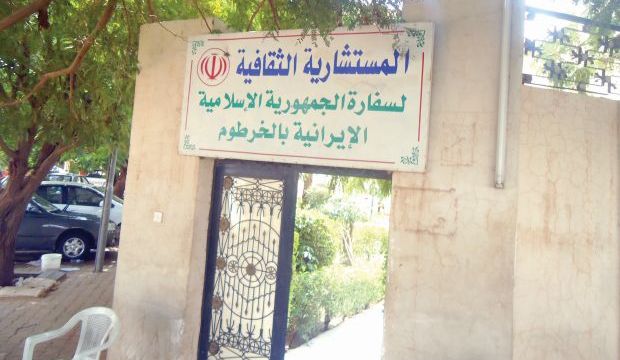
This undated file photo shows the entrance to the Iranian cultural center in Khartoum, Sudan. (Asharq Al-Awsat)
Khartoum, Asharq Al-Awsat—Sudan ordered the closure of an Iranian culture center in Khartoum on Monday, saying that the center represented an intellectual and social threat to the country.
In a statement, the Sudanese Ministry of Foreign Affairs said the center had “exceeded its mandate and terms of reference that define the activities it is authorized to perform.”
“Based on this information the Ministry has summoned the Iranian charge d’affaires in Khartoum and informed him of its decision to close the cultural center in Khartoum and its various branches across the country, and to give the Iranian cultural attaché and the staff a 72-hour deadline to leave the country,” the statement added.
The diplomatic spat between Tehran and Khartoum has surprised observers, given the recent overt military cooperation and political support between Sudan and Iran.
“We have been closely monitoring the activities of the center in Khartoum to verify that it is committed to cultural activities rather than seeking to make Shi’ite, sectarian gains that are alien to Sudanese society,” Sudanese Foreign Minister Ali Karti told Asharq Al-Awsat by telephone.
Karti confirmed that the Sudanese presidency had rejected a request from Iran to reverse its decision to close the center.
Sudan’s top diplomat said activities organized by the center in poor neighborhoods and university campuses across Sudan “confirmed to us beyond any doubt the center has deviated from its agreed-upon cultural role.”
Karti told Asharq Al-Awsat that Sudanese authorities had called on Tehran to stop what he described as “Shi’ite proselytizing” but that the cultural center had refused to comply.
“Unfortunately, the Iranians behind these exploitative activities were trying to spread Shi’ism by offering financial gains as well as other unacceptable means,” the Sudanese foreign minister said.
The Foreign Ministry had summoned the center’s leadership on several occasions in the past to complain about its activities, Karti told Asharq Al-Awsat.
The cultural center’s continued non-compliance prompted the presidency to issue the “necessary decision, which came as a shock and surprise to the officials in Tehran,” he said.
The first Iranian cultural center was established in Khartoum in 1988 during the premiership of Sadiq Al-Mahdi. Suspicions about the center’s role in promoting Shi’ism were first raised in 2009 when the center publicly celebrated the birth of Imam Al-Mahdi. The Mahdi is an important figure in Islamic eschatology—Shi’ite Muslims believe he was born in 869 CE and is currently in “occultation,” returning only at the End of Days. Sunni Muslims, on the other hand, believe the Mahdi is yet to appear.
The decision marks a major turning point in Khartoum’s foreign policy, a prominent expert on Islamist politics, speaking on the condition of anonymity, told Asharq Al-Awsat.
Khartoum’s surprising decision to shut down the Iranian cultural center and expel its staff comes as a result of a conflict between the Sudanese defense and foreign ministries over Khartoum’s ties with Tehran, the expert said.
Sudanese Defense Minister Abdel Rahim Mohammed Hussein is a staunch supporter of stronger ties with Tehran, while the Foreign Ministry would prefer looser ties with Iran, which in turn would allow Sudan to pursue stronger ties with Arab Gulf states.
“The Foreign Ministry has always been against ties with Iran, deeming it as harmful to the country’s foreign relations,” the source said.
“Maintaining relations with Iran spoils [Sudanese] diplomatic efforts to reach reconciliations with the Gulf States and [other] major countries,” he added.
